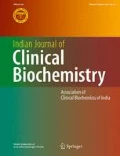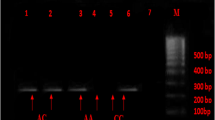Abstract
Genetic variation in the angiotensin II type 1 receptor (AT1R) has an important effect on the outcome of acute coronary syndrome (ACS) initiated treatment with captopril. This study aims to investigate the impact of genetic polymorphism of AT1R (rs5186 and rs275651) on the ACS outcome in Iraqi patients treated with captopril. A total of 250 Iraqi individuals with ACS were included in this case—control study and they were divided into two study groups; Study group 1 included 125 participants who were prescribed captopril, 25 mg twice daily and study group 2 included 125 participants who received no captopril as part of their ACS treatment (control study). The AT1R gene (rs5186) CC genotype was found to be associated with ST-elevation myocardial infarction (STEMI) (Odd’s ratio (O.R) = 1.2, P = 0.7), while AC was associated with Non-ST-elevation myocardial infarction (NSTEMI) and unstable angina (UA) (O.R = 1.2, P = 0.8). AC genotype is more prone to have Percutaneous coronary intervention (PCI) after ACS attack (O.R = 1.2, P = 0.6). CC genotype had a risk to get less improvement (O.R = 1.6, P = 0.5), so might require higher doses of captopril during acute coronary insult. The AT1R gene (rs275651) AA genotype was associated with UA (O.R = 1.3, P = 0.9). AA and AT genotypes were more prone to have PCI after ACS attack (O.R = 3.9 P = 0.2, O.R = 3.5, P = 0.3 respectively) and thus requiring higher doses of captopril. We conclude that the AT1R rs5186, rs275651 genetic polymorphisms might partially affect the clinical outcome of ACS patients treated with captopril and might have captopril resistance which requires higher doses.

Similar content being viewed by others
References
Galli M, Porto I, Andreotti F, D’Amario D, Vergallo R, Della Bona R, et al. Early anticoagulation in the current management of NSTE-ACS: evidence, guidelines, practice and perspectives. Int J Cardiol. 2019;275:39–45.
Dababneh E, Goldstein S. Chronic ischemic heart disease, selection of treatment modality. StatPearls. Treasure Island (FL): StatPearls Publishing StatPearls Publishing LLC.; 2018.
Yamada Y, Yasukochi Y, Kato K, Oguri M, Horibe H, Fujimaki T, et al. Identification of 26 novel loci that confer susceptibility to early-onset coronary artery disease in a Japanese population. Biomed Rep. 2018;9(5):383–404.
Lu H, Chen Y, Li L. Metabolic pathway genes associated with susceptibility genes to coronary artery disease. Int J Genom. 2018;2018:9025841.
Liu B, Pjanic M, Wang T, Nguyen T, Gloudemans M, Rao A, et al. Genetic regulatory mechanisms of smooth muscle cells map to coronary artery disease risk loci. Am J Hum Genet. 2018;103(3):377–88.
Schunkert H, von Scheidt M, Kessler T, Stiller B, Zeng L, Vilne B. Genetics of coronary artery disease in the light of genome-wide association studies. Clin Res Cardiol Off J Ger Card Soc. 2018;107(Suppl 2):2–9.
Brida M, Webb G. Renin-angiotensin-aldosterone system blockade in systemic right ventricle. Int J Cardiol. 2019;279:62–3.
Ozturk O, Ozturk U, Nergiz S, Karahan MZ. The relationship between angiotensin-II type 1 receptor gene polymorphism and repolarization parameters after a first anterior acute myocardial infarction. Korean Circ J. 2016;46(6):791–7.
Kontou P, Pavlopoulou A, Braliou G, Bogiatzi S, Dimou N, Bangalore S, et al. Identification of gene expression profiles in myocardial infarction: a systematic review and meta-analysis. BMC Med Genom. 2018;11(1):109.
Li Y, Li X, Jia N, Guo S, Chu S, Niu W. Meta-analysis of the association between angiotensin II receptor, type 1 gene A1166C polymorphism and coronary artery disease in Chinese populations. J Renin-Angiotensin-Aldosterone Syst JRAAS. 2013;14(1):82–90.
Liu DX, Zhang YQ, Hu B, Zhang J, Zhao Q. Association of AT1R polymorphism with hypertension risk: An update meta-analysis based on 28,952 subjects. Journal of the renin-angiotensin-aldosterone system: JRAAS. 2015;16(4):898–909.
de Denus S, Dube MP, Fouodjio R, Huynh T, LeBlanc MH, Lepage S, et al. A prospective study of the impact of AGTR1 A1166C on the effects of candesartan in patients with heart failure. Pharmacogenomics. 2018;19(7):599–612.
Bayramoglu A, Kurt H, Gunes HV, Ata N, Birdane A, Dikmen M, et al. Angiotensin II type 1 receptor (AT1) gene A1166C is associated with the risk of hypertension. Genet Test Mol Biomark. 2015;19(1):14–7.
Weeke PE. Pharmacogenetics in cardiovascular medicine. Adv Pharmacol (San Diego, Calif). 2018;83:333–60.
Mahmoudpour SH, Veluchamy A, Siddiqui MK, Asselbergs FW, Souverein PC, de Keyser CE, et al. Meta-analysis of genome-wide association studies on the intolerance of angiotensin-converting enzyme inhibitors. Pharmacogenet Genom. 2017;27(3):112–9.
Wang N, Li X, Zhang Q, Zhang H, Zhou L, Wu N, et al. Association of angiotensin-converting enzyme gene polymorphism with pulse pressure and its interaction with obesity status in Heilongjiang province. Clin Exp Hypertens. 2019;41(1):70–4.
Zhu M, Yang M, Lin J, Zhu H, Lu Y, Wang B, et al. Association of seven renin angiotensin system gene polymorphisms with restenosis in patients following coronary stenting. J Renin-Angiotensin-Aldosterone Syst JRAAS. 2017;18(1):1470320316688774.
Cervellin G, Mattiuzzi C, Bovo C, Lippi G. Diagnostic algorithms for acute coronary syndrome-is one better than another? Ann Transl Med. 2016;4(10):193.
Gach O, El HZ, Lancellotti P. Acute coronary syndrome. Rev Med Liege. 2018;73(5–6):243–50.
O’Gara PT, Kushner FG, Ascheim DD, Casey DE Jr, Chung MK, de Lemos JA, et al. 2013 ACCF/AHA guideline for the management of ST-elevation myocardial infarction: a report of the American College of Cardiology Foundation/American Heart Association Task Force on Practice Guidelines. Circulation. 2013;127(4):e362–425.
Expectancy WL. World health rankings: Live longer live better 2017. https://www.worldlifeexpectancy.com/iraq-coronary-heart-disease.
Bozina T, Lovric J, Simicevic L, Merkler A, Bozina M, Jelakovic B, et al. Can the choice of diet undermine the potential genetic risk of AT1R 1166A > C gene polymorphism? Gene. 2018;679:291–6.
Tamaki S, Nakamura Y, Tabara Y, Okamura T, Kanda H, Kita Y, et al. Association between polymorphism of the AGTR1 and cardiovascular events in a Japanese general sample (The Shigaraki Study). Int J Cardiol. 2009;136(3):354–5.
Ceolotto G, Papparella I, Bortoluzzi A, Strapazzon G, Ragazzo F, Bratti P, et al. Interplay between miR-155, AT1R A1166C polymorphism, and AT1R expression in young untreated hypertensives. Am J Hypertens. 2011;24(2):241–6.
Parchwani DN, Patel DD, Rawtani J, Yadav D. Analysis of association of angiotensin II Type 1 receptor gene A1166C gene polymorphism with essential hypertension. Indian J Clin Biochem IJCB. 2018;33(1):53–60.
Fung MM, Rao F, Poddar S, Mahata M, Khandrika S, Mahata SK, et al. Early inflammatory and metabolic changes in association with AGTR1 polymorphisms in prehypertensive subjects. Am J Hypertens. 2011;24(2):225–33.
van Geel PP, Pinto YM, Voors AA, Buikema H, Oosterga M, Crijns HJ, et al. Angiotensin II type 1 receptor A1166C gene polymorphism is associated with an increased response to angiotensin II in human arteries. Hypertension. 2000;35(3):717–21.
Martinez-Rodriguez N, Posadas-Romero C, Cardoso G, Perez-Rodriguez JM, Perez-Hernandez N, Vallejo M, et al. Association of angiotensin II type 1-receptor gene polymorphisms with the risk of developing hypertension in Mexican individuals. Journal of the renin-angiotensin-aldosterone system: JRAAS. 2012;13(1):133-40.
Brugts JJ, Isaacs A, Boersma E, van Duijn CM, Uitterlinden AG, Remme W, et al. Genetic determinants of treatment benefit of the angiotensin-converting enzyme-inhibitor perindopril in patients with stable coronary artery disease. Eur Heart J. 2010;31(15):1854–64.
Author information
Authors and Affiliations
Corresponding author
Ethics declarations
Conflict of interest
All authors declare that they have no conflict of interest.
Ethical Approval
All procedures performed in studies involving human participants were in accordance with the ethical standards of the institutional and/or national research committee (Faculty of Medicine, University of Kufa, reference number KUM456) and with the 1964 Helsinki declaration and its later amendments or comparable ethical standards.
Additional information
Publisher's Note
Springer Nature remains neutral with regard to jurisdictional claims in published maps and institutional affiliations.
Rights and permissions
About this article
Cite this article
Ghafil, F.A., Mohammad, B.I., Al-Janabi, H.S. et al. Genetic Polymorphism of Angiotensin II Type 1 Receptors and Their Effect on the Clinical Outcome of Captopril Treatment in Arab Iraqi Patients with Acute Coronary Syndrome (Mid Euphrates). Ind J Clin Biochem 36, 81–87 (2021). https://doi.org/10.1007/s12291-019-00860-x
Received:
Accepted:
Published:
Issue Date:
DOI: https://doi.org/10.1007/s12291-019-00860-x




